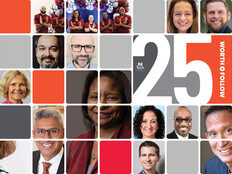When Academic Freedoms and Modern Media Collide
Academic freedom is perhaps the most enduring and sacrosanct principle in American higher education. But should it be upheld in social media as it is within more traditional modes of expression?
Faculty, students and the general public all benefit from the free exchange of information and ideas, whether conducted orally, in print or electronically. Trustees, politicians and administrators are concerned, correctly, about their institutions' reputation and image. But a university that curtails free expression is likely to suffer far greater damage to its standing than any ill-considered or controversial social media message might cause.
Some politicians and university leaders now act as though the principles of academic freedom should not be applied when it comes to social media. In a recent, notorious example, the Kansas Board of Regents promulgated a policy that, among other things, threatens faculty with dismissal for electronic messages "contrary to the best interest of the university," as well as communication that "impairs discipline by superiors or harmony among co-workers, has a detrimental impact on close working relationships" or "interferes with the regular operation of the university, or otherwise adversely affects the university's ability to efficiently provide services." (See kansasregents.org/policy_chapter_ii_c_suspensions.)
The American Association of University Professors (AAUP) — whose 1915 and 1940 policy statements on academic freedom are the principle's foundational documents — since 2004 has held that "academic freedom, free inquiry, and freedom of expression within the academic community may be limited to no greater extent in electronic format than they are in print, save for the most unusual situation where the very nature of the medium itself might warrant unusual restrictions."
No Better Time Than Now
In a new and expanded policy on "Academic Freedom and Electronic Communications," AAUP reaffirms and extends this coverage to social media. With faculty use of such tools only continuing to rise, the extension is timely.
According to a recent Pearson and Babson Survey Research Group Study, "Social Media for Teaching and Learning," 70 percent of faculty members had visited a social media site within the previous month for personal use, a rate that rose to 84 percent when those who use such sites less frequently are added. More than 55 percent said they made professional use of social media outside the classes they teach, and 41 percent reported use of social media in their teaching.
Academic freedom comprises four elements: the freedom to teach, the freedom to research, the freedom to comment on matters of public concern as a citizen, and the freedom to speak out on internal institutional affairs.
The first two elements are limited by disciplinary expertise; professors are not, for instance, free to discuss anything or advance any idea in their classrooms, including digital classrooms, beyond what pertains to their subject matter. The second two elements, however, derive not from disciplinary competence but from higher education's role as a public good and a school for democratic citizenship.
Institutions should work closely with their faculty to develop policies that appropriately govern the use of social media and all electronic communications technologies. While such policies must take into account genuine security concerns and legal restrictions — for instance, no one is permitted to reveal confidential student information through social media — they must start from the premise that faculty members have the freedom to address the larger community with regard to any matter of social, political, economic or other interest, without institutional discipline or restraint.
Policies that restrict such freedom will only undermine the ability of colleges and universities to fulfill their mission and serve the common good. And institutions that fail to defend academic freedom — in social media or anywhere else — almost always end up harming themselves most of all.








